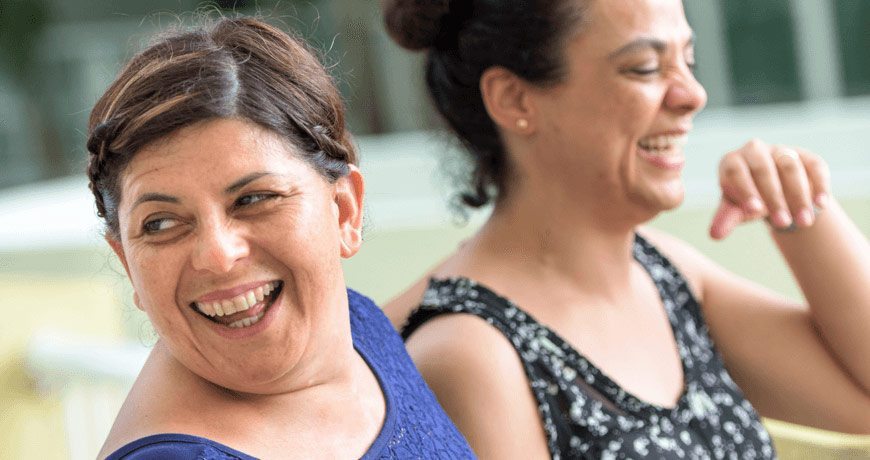The Gift of Menopause

When talking about the gift of menopause among friends and family I have heard some women say “I never went through menopause”.
This is like saying “I never went through puberty”.
What they actually mean is that they didn’t experience some of the more common signs of menopause. Symptoms such as hot flushes and night sweats alert women to being in perimenopause. But just because you didn’t experience these signs doesn’t mean you didn’t go through menopause.
Because every woman does if she lives long enough.
Menopause, consisting of perimenopause, menopause and post-menopause is a universal female life stage. It’s not an option, it’s a reality. And what’s more, it’s truly a gift. Yes, I know it doesn’t feel like it. But the way I look at it, menopause is the gift of healthy living.
Indeed, that’s what I mean by the gift of menopause.
The most obvious reason for this gift is being able to say goodbye to our childbearing years. Although I do realise that some of you mourn the passing of your fertility, especially if you weren’t able to have children. But imagine the alternative if we didn’t have menopause – you would continue to menstruate until your body was very old. Menopause closes the door of reproduction and opens another – the doorway to healthy ageing.
There’s nothing sexy about the concept of healthy ageing you may be muttering. However, with women living into their 80’s these days, we can expect to live more than 30 years post-menopause. So best we live them in good health!

Compared to our grandmothers we are less equipped to do this. We lead sedentary lives these days. Indeed, compare how their daily chores must have looked in relation to ours today with our automatic everything. Even when their first TV set arrived they still had to get up from their seat to turn it off! Throw in our increased exposure to stress and no wonder so many of us are ill-prepared for a healthy life post-menopause.
Perimenopause is your body’s alarm clock telling you it’s time for you to be more mindful of your health. During your 20’s and 30’s, you may have been able to get away without optimal nutrition or any exercise. But it’s not so in your 40’s and 50’s and beyond. This is the time for regular health checks and adopting a preventative health plan. Literally, your life depends upon it.
For those in the sandwich generation – women caught between raising children and caring for elderly parents while holding down a full-time job – this isn’t easy. In fact, it’s often the time in your life when exercise goes out the door and your nutrition suffers. On top of that, you may be entering perimenopause and life gets even tougher. Remember, perimenopause is your personal gift – telling you that it’s time to proactively look after your body and your health. And here’s why…
The wellbeing of your 40 or 50-year-old body is under threat from:
Cardiovascular disease including heart attack and stroke
Globally, cardiovascular disease, often thought to be a ‘male’ problem, is the number one killer of women. In 2013, 2920 women died of heart disease in New Zealand. That’s eight women a day – or about 55 each week.
Weight gain
As you age your metabolism slows, making weight gain an issue even as early as age 35 or 40. Excess weight increases your risk of cancer, strains your heart and joints and puts you at risk of developing diabetes.
Diabetes
Obesity and diabetes are rapidly growing concerns. A recent study in New Zealand showed 31% of adults are obese and another 35% overweight. The onset of Type 2 diabetes is linked to obesity and is a huge factor in heart disease and heart attacks.
Osteoporosis
Rapid bone thinning occurs early in post-menopause when estrogen levels plummet. Consequently, this puts your bones at risk of fracture. A serious fracture, such as the hip, can put you at risk of pneumonia and other complications of being bed-bound.
Cancer
Your risk of breast cancer continues to increase every year of your life until you reach roughly 80 years old. Meanwhile, the risk of other cancers such as colon increase from age 50 and beyond.

Conclusion
The good news is, that often these conditions can be prevented. Your independence and quality of life in the last third of your life can be maintained. Lives can be saved.
But only if you take a proactive approach to your health. Visit your doctor and work with them to prevent disease or catch a problem early. Assess your diet, set an exercise plan, understand how to control stress. Above all, don’t fall into the trap of assuming that because you feel fine you must be healthy.
As we go through our 30’s and 40’s we aren’t thinking about these health concerns. They are for when we get old! We have busy lives – working, caring for family and running households. And along the way, we cross the unmarked line into the life stage when we need to start taking care of ourselves.
Perimenopause is your red flag telling you that line has been crossed. Look for the signs. Embrace them and act – now.






